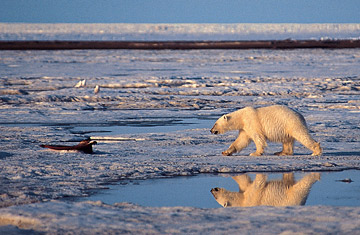
The cuddly polar bear has become global warming's favorite mascot. It's also become a political flash point: on one side, conservation groups say global warming threatens the bear by permanently damaging its Arctic habitat. On the other, conservative groups say the so-called plight of the polar bear is a gambit to intensify climate change hysteria. The battle flared up again last Monday, when a California federal district court judge ordered the Fish and Wildlife Service (FWS), the Interior Department agency that evaluates endangered species, to decide on the polar bear by May 15 (a four-month extension of the original due date of Jan. 9). If FWS lists the bear as endangered, it would be the first mammal to face extinction due to global warming.
The question is whether the polar bear is actually in enough danger to warrant official government protection. Last year, a study by the U.S. Geological Survey (USGS) concluded that two-thirds of the world's polar bears could disappear in the next 50 years if Arctic sea ice continues to evaporate at its current rate — sea ice is essential for polar bears, serving as the platforms from which they hunt. Similar discussion is ongoing in Canada, where two-thirds of the world's estimated 20,000 to 25,000 polar bears reside. Last week, a Canadian scientific committee ruled that the bears should be considered a "special concern species," meaning there's reason for concern but not panic.
Pete Ewins, director of species conservation at World Wildlife Fund–Canada, says there's a general consensus in the scientific community that global warming inaction will result in reduced polar bear numbers, but admits that the data isn't entirely conclusive. "The problem comes when people start asking if we know everything we need to know about polar bears everywhere," he says. "The answer is, no. But a lack of scientific certainty hasn't been taken by the majority of polar ecologists as a reason to assume everything is O.K."
But those who oppose listing the polar bear, including several western Senators, say that the species does in fact appear to be O.K. Oklahoma Senator James Inhofe, the ranking Republican member of the Senate Environment and Public Works Committee, calls sea ice studies such as the one run by USGS a "classic case of reality versus unproven computer models." In fact, he says, the number of polar bears has increased over the past half-century as a result of initiatives like the 1973 Agreement on the Conservation of Polar Bears, which sharply curtailed bear hunting; he thinks declaring the animal endangered would be a purely political move, a way to achieve global warming policy that eschews the legislative process. It's a classic bait-and-switch maneuver, he says, that would effectively turn the Endangered Species Act into a climate change law.
"The implications of such a policy would lead to drastic increases in litigation and eager lawyers ready to find ways to shut down energy production," says Inhofe, who has held two hearings this year for which he rounded up a retinue of doubtful experts. "These special interest groups believe no oil and gas leases should be allowed until the bear is listed, its critical habitat designated and a recovery plan put in place. That could be a very long time."
Those oil- and gas-drilling leases include the $2 billion February sale of rights to 30 million acres of the Chukchi Sea off Alaska's northwest coast, home to about a fifth of the world's remaining polar bears. Kassie Siegel of the Center for Biological Diversity and the author of the initial petition to list the polar bear takes the opposite view; she figures the FWS decision was delayed to allow the sale to go through in the first place. Not surprising coming from an Administration Siegel calls rabidly "anti-wildlife." The scarcity of animals that have been listed endangered during the Bush years is undeniable: 59 in seven years. Bill Clinton added 521 during his two terms and George H.W. Bush listed 231 during his four years. Siegel's group has filed petitions on behalf of a number of other species, including the ribbon seal and a dozen different types of penguins. She's willing to file more lawsuits and ready to fight for her charges. Sort of like an angry polar bear.
